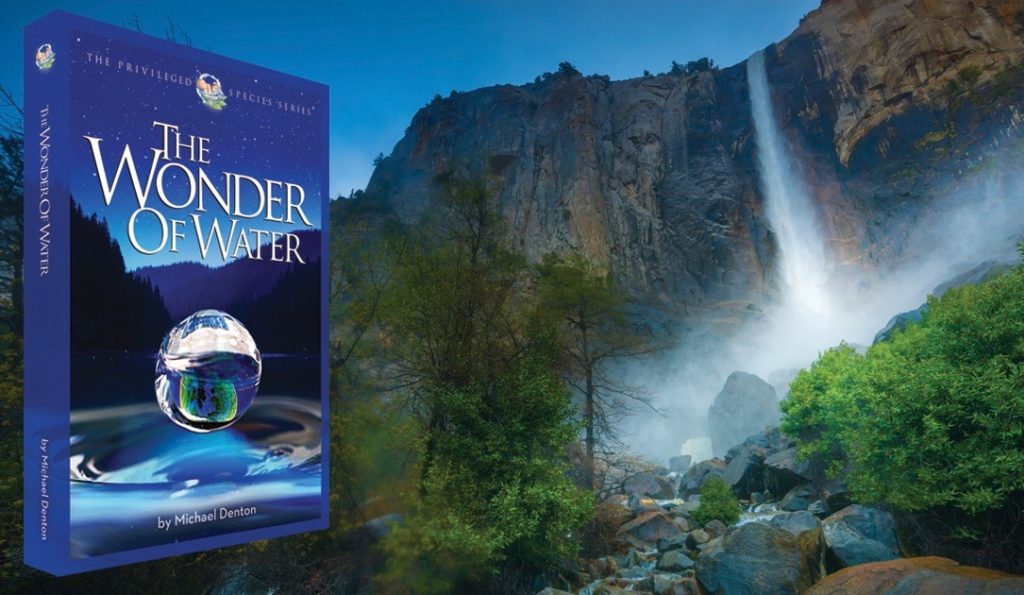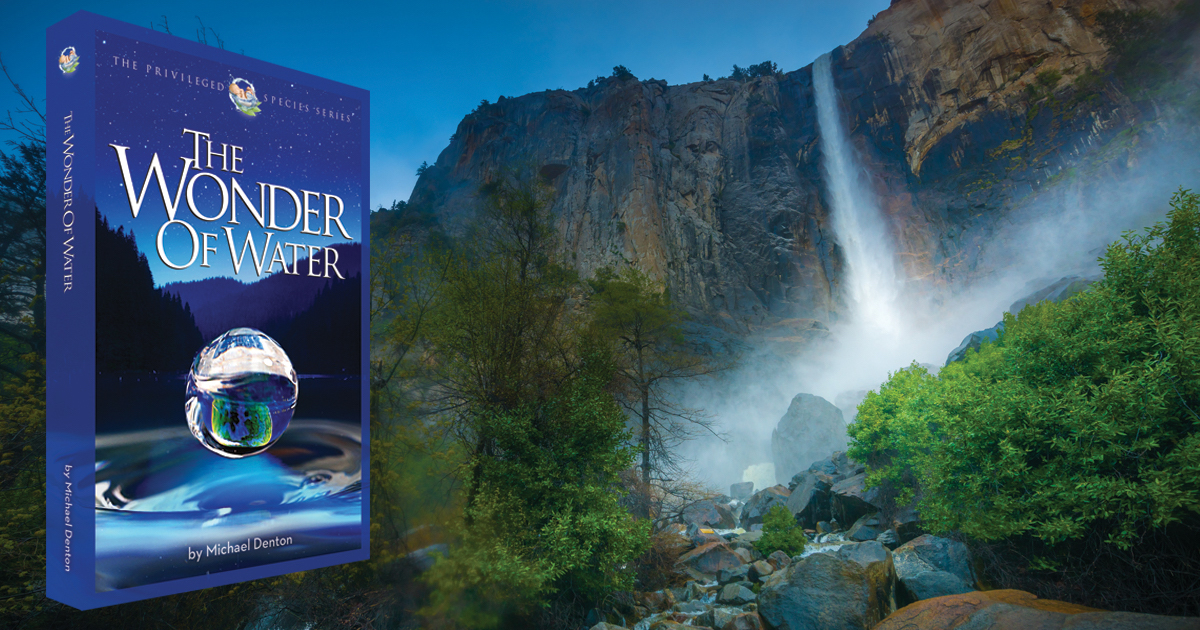 Intelligent Design
Intelligent Design
 Life Sciences
Life Sciences
Wonderful! Michael Denton’s New Book, The Wonder of Water, Is Out


Could you write 200 pages about water – and make it fascinating? Discovery Institute biologist Michael Denton does. In his new book, The Wonder of Water, Denton accomplishes a lot more than reciting a list of properties of H2O. He shows how these properties are interrelated for the apparent purpose of allowing complex life to exist on our planet.
In the preface, for instance, summoning an image of Yosemite’s Bridalveil Fall, he shows how our bodies depend on two properties of water, seemingly unrelated: its ability to erode minerals out of rock, and its ability to course easily through our capillaries.
If water served only these two very different vital ends, it would be miracle enough. But as we shall also see in the chapters ahead, water’s unique fitness for life on Earth involves a vast ensemble of additional elements of fitness serving a vast inventory of diverse vital ends. These include the formation of the Earth itself, formation of the oceans, climate moderation and the hydrological cycle, tectonic plate movement, continent formation, and photosynthesis. The unique properties of water are also needed to make soil, cool the human body, fold proteins, and form cell membranes. Water enables phenomena and processes that unfold on vastly different spatial and temporal scales, from thousands of kilometers and millions of years to nanometers and milliseconds.
With a list like that, maybe a 200-page book is too short! Dr. Denton proceeds to elaborate on these and other amazing “coincidences” that make water the ideal medium for large, complex living beings such as ourselves.
Consider, for instance, how Earth’s atmosphere and temperature permits water in all three of its physical states: solid, liquid, and gas. The nearest competitors with similar molecular weights, he shows, have boiling points far below that of water, forcing them to exist at room temperature only as a gas (like nitrogen and carbon dioxide). The water molecule’s unique ability to form complex networks with hydrogen bonds gives it a cohesion or “stickiness” that enables something grander than the molecule’s mundane “mouse ear” shape: the hydrological cycle.
In effect, the hydrological cycle is enabled not by one unique property of water, but by several properties that “conspire together,” as it were, to turn the “wheel” and provide water for land-based life.
Without the hydrological cycle the entire land surface of Earth would be a dehydrated, lifeless waste, more lifeless than the Atacama or any of the most dehydrated deserts currently on Earth. Although the importance of the hydrological cycle is widely acknowledged, what is, as far as I am aware, never mentioned is the remarkable fact that the delivery of water to the land, an essential medium of all life on Earth, is in effect carried out by and dependent upon the properties of water itself, unaided by any other external regulatory systems.
If you’re starting to develop a thirst for more of Denton’s exceptional style for making the ordinary seem extraordinary, you’ll want to read on. He’s only getting started. By the end, you’ll be swimming in a clear pool of astonishing facts, coming up for air at the “wonder” of water.
To what can we attribute this “conspiracy” of properties that supports a magnificent network of complex living beings on our planet? Denton stops short of endorsing intelligent design as the explanation for water’s life-giving properties. Asking “Design?” in the concluding pages, he says:
Whether the remarkable instances in which various properties of water work together to serve a vital end — such as the suite of properties involved in eroding rocks, or the suite of thermal properties involved in temperature regulation — are actually the result of design or not, there is no doubt that they convey a compelling impression of design.
But that’s just Denton’s empirical caution at drawing firm conclusions from data. As a scientist, he knows there’s always room for some doubt and debate. Any reader, though, will be sufficiently overwhelmed by evidence as to be convinced beyond a reasonable doubt that the conspiracy is real. Clearly, the burden of proof for non-design explanations will lie with the materialist.
Having dispensed with Darwinian evolution in his previous books, including the recent update to his first bombshell book, Evolution: Still a Theory in Crisis, Denton has materialists on the defensive. Facing Denton’s water cannon, they had best not offer up the Darwinian option again. So what other explanation could there be? Sheer dumb luck? Blind laws that somehow had humans in mind as a distant goal? The former is irrational, the latter contrary to all experience. Purposeful results imply a purposeful beginning. Denton lets each reader draw the obvious conclusion without pressure.
The Wonder of Water is part of the Privileged Species Series, a collection of media offering drawing together evidences that illustrate how the cosmos is designed for human life. It elaborates on themes in the beautiful film Privileged Species that introduced the concept that ours is not only a Privileged Planet, but a privileged habitat for complex beings like us. This new book, released today, is a pleasure to read. So dive in and get refreshed in a pool of sparkling ideas.
Image: Bridalveil Fall, by Krzysztof Wiktor via Adobe Stock.
